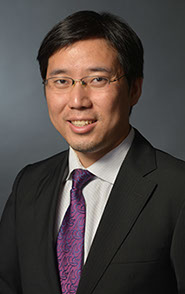_01.png?crc=4174553115)
Cover Story
Research
People
Books
Archive
Download PDF
Download PDF
E-book version
Teaching
and Learning
Knowledge
Exchange
The paper, entitled ‘The Power of Whispers: A Theory of Rumour, Communication and Revolution’, is by Dr Heng Chen and Professor Wing Suen of the Faculty of Business and Economics, and the starting point for the research behind it was in the context of revolutions and the role the rumour plays in sparking or enflaming collective action.
It was 2011 and the Arab Spring protests were taking place. They began with revolution in Tunisia, and quickly spread to five other countries – Libya, Egypt, Yemen, Syria and Bahrain – where either the regime was toppled or major uprising occurred. As they progressed, considerable attention became focussed on the role of social media and digital technologies in the protests, as participants circumvented state-operated media channels and used the internet to call for collective activism.
“The influence of social media on political activism during the Arab Spring has been much debated,” said Dr Chen. “I wanted to contribute to that discussion.”
Protests took place both in states with a very high level of internet usage (such as Bahrain with 88 per cent of its population online) and also in states with low internet penetration such as Yemen and Libya. The use of social media platforms more than doubled in Arab countries.
Stories – both true and false – abounded, and one in particular struck Dr Chen as interesting. “The opposition to the status quo put out a rumour that Egyptian President Hosni Mubarak’s son and his family had left Egypt for London taking with them 97 suitcases. It was the luggage part that made it interesting – and interesting is what a rumour must be in order to spread. In fact, whether it is interesting is more important to its efficacy than whether or not it is true, and is the key factor in its likelihood to succeed in sparking collective action.”
The rumour – which was not true – was soon being reported in media around the world. For example Britain’s Sun tabloid said: “The panic-stricken family of President Mubarak has reportedly fled Egypt for the luxurious refuge of their £8.5million London townhouse. The leader’s son Gamal, 47, is said to have spearheaded the move, flying to Britain on a private jet with his own family and NINETY-SEVEN pieces of luggage.”
Call to collective action
“Clearly the revolutionaries put the rumour out hoping to mobilise more people to their cause,” commented Dr Chen. “It is a spark to collective action – if people think the status quo is about to be toppled they are more likely to join. They also want to be part of history, so they will go out on the streets.
“Fast-forward to the US election in 2016 and rumours abound – Russia, Clinton’s emails, numerous stories about Trump. There is nothing new in that, what is new is the way Trump attacked the media and started making ‘fake news’ claims.”
The common aspect is ‘collective action’, for which you need ‘complimentarity’ whereby growing numbers of people go along with the rumour, and as they do so more join them as they don’t want to miss out.
Dr Chen said: “Amid the turmoil of politics– whether an election or a revolution – you know someone will cook up something to get a reaction and cause people to take a stance or to take action. Rumours always surround collective actions, which leads us to one of the main questions we wanted our research to answer: Why do people believe these stories? What makes a rumour – particularly an outlandish rumour – so effective?”
They realised that communication is key, and therefore the rumour must be interesting enough for people to want to talk about. “The stories that are most effective are those that are close to what people already believe. For instance, the story Trump put out questioning Obama’s birthplace. Hence, firstly a popular rumour occurs when people already have certain suspicions which the rumour seems to confirm.”
“Second, it has to be something people will discuss. Information exchange must occur to keep the rumour alive. It is a signal for people to assess what they do and don’t believe, to consider the veracity of the rumour and to be influenced by what others believe.”
Truth is less interesting
By the same token, trustworthy news is often less effective – simply because it is true. If it is a fact then there is nothing to discuss and no opportunity for an exchange of views on its veracity. It is because rumours are not 100 per cent verifiable, that they leave room for people to think about them. It is the uncertainty that keeps them alive.
Dr Chen said: “The fake news of 2016 was not that different to previous elections, what is different is social networks dominate our lives. Rumours used to travel by donkey – now they have a high-speed train! Their production is easier and faster, and you can see over the internet what many people believe, not just your neighbour. The second new aspect is that Trump is attacking the media, Obama and Clinton tended not to comment.”
The research has practical applications, addressing how governments and corporations can deal with rumours. “Leaving the situation uncertain is a bad strategy,” said Dr Chen. “People will keep talking if there is uncertainty about a story. Therefore turn a soft rumour into hard news – either refute the rumour or verify it. Ensure people know if it is true or untrue – that leaves it unworthy of discussion.
“Blocking information is also not the way to go – people will infer what they want to believe from the silence, so you create more uncertainty and therefore more interest. Again, it is uncertainty that is key – to stop the gossip, be clear about what the situation really is. Erase the uncertainty.”

Rumour Has It
The author Terry Pratchett once said: “A lie can run around the world before the truth has got its boots on.” Research into false rumours and how they spread is proving particularly pertinent in Trump’s era of so-called fake news and questionable facts.

![]() The fake news of 2016 was not that
The fake news of 2016 was not that
different to previous elections, what is
different is social networks dominate our lives. Rumours used to travel by donkey – now they have a high-speed train! Their production is easier and faster, and you can see over the internet what many people believe, not just
your neighbour. ![]()
Dr Heng Chen
Back
_12.png?crc=3961914953)